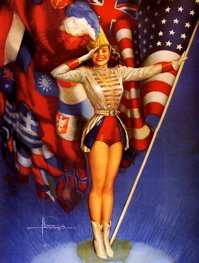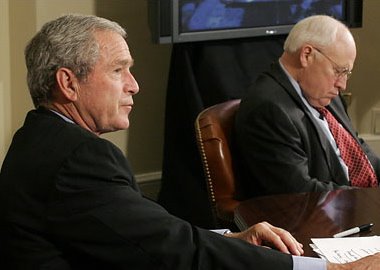This post is long overdue, and consequently I might only be pointing out the obvious. It's been obvious to me all along, so it's hard to tell.
I was born in 1969, so I'm not an expert in Vietnam War-era politics. But as I understand it...
There was a radical revolution underway in the mid-60s to mid-70s, in which all the previous social mores were being challenged. For every point of conventional wisdom, there was someone standing up and saying, "Why? Says who?" This made a huge mess in some areas, while changing the world for the better in others. I can't fault anyone who was looking at something in a new way, not only because I respect such questioning, but also because once one starts questioning one thing, it's hard to stop. Why should one thing be set in stone when other stones are being overturned? How does one know which stones are right and which need turning until you turn them?
In this environment, there were many, many movements trying to reconceive preconceptions and work towards their own agendas. One person might identify with several movements-- that is, "I'm against segregation, for women's rights, and against the war,"-- but that is not to say that all radical movements identified with each other, or that any radical person shared all the radical beliefs. One might be a feminist for the war, or an integrationist who doesn't like "treehuggers". But it is very easy, in 40 years of hindsight, to look back and lump them all together. Many people even see a hippie on the street today and assume that they know all of his/her politics. But that is a misconception.
And in this Vietnam War-era, there was a "perfect storm" that led to soldiers coming home from the war and being spit on.
1. The peace movement (or, to avoid generalization, some parts of the peace movement) was saying that war and killing is always wrong. After 30 years of wars, this was radical-- and like many radical statements, people tried to paint it with a broad brush. It might be true that war is bad and killing is wrong, but I think we know today that sometimes it's justified and sometimes it's not. Back then it was being perceived as much more black-and-white. And again, this makes sense to me. How are you reconceiving something if you are compromising with it? Sometimes the first new thoughts on a subject have to be wild and strident. Following that can be debate and consensus.
2. There was a draft. This meant that people were being called up to fight regardless of their feelings on the subject, rather than the volunteer army that we have today. Today people join the army the way others join the police force-- because of an honorable desire to protect and serve. In a draft, it's almost like kidnapping your children and making them fight.
And in this era of radical thinking, there were some who stood up and said, "Why?" Why should you allow yourself to be drafted just because "your parents" (i.e., the establishment) said so? Why not burn your draft card and run off to Canada? These people were really thinking outside the box, and again, I can't blame them. They were questioning so many other things, and some of those radical ideas were really panning out, why wouldn't they question this and come up with a radical solution?
But the flip side of this was that if you didn't burn your draft card, if you went ahead and showed up to be a soldier, then you were branded as someone who lacked the courage to stand up against The Man, someone who was colluding with the Murdering War Machine. And though now that things have calmed down over the course of 40 years, we can look back and say that leap of logic was faulty, I don't think it seemed that way at the time. At the time, it was "You could have been a radical, but you became a sheep. Shame on you!" And really, in the context of the day, I think that made a certain amount of sense to people, and I can't fault them for thinking that way. This is the "first straw", if you will, the first step that led to the spitting, this idea made famous so many years later by our President, "You're either with us or against us." So if you were a soldier, then you have thrown in with the Evil Ones who were pushing and manhandling the war, so you are just as much at fault as they are.
3. The war was a mess. It wasn't being fought properly or won. And so the voices of those who said, "Hang on a minute! Can we think about this?" joined those who were saying, "War is evil!" and as I mentioned before, the chorus began to sound like one voice, instead of the choir of many voices each with their own take on things.
4. There was a lot of weirdness going on in Viet Nam. I'm not trying to color all soldiers the same, but one of the problems with the draft was that it was taking everyone, including the less honorable, and those who were forced to go and didn't want to be there were "acting out" as we might say now. There were rapes, senseless killing of civilians, extensive drug use, etc. It was a broad and long war, and statistically I guess some things are bound to happen if the war is broad enough and long enough. And you'll notice we haven't had a draft since, so I think that the Pentagon saw what the cost could be if you take everyone. But this was another straw, the perception that soldiers back from Viet Nam were suspect in some way. Who knew what the vet sitting next to you on the bus was up to just a few months ago? And the public was one step closer to spitting.
5. There was no ticker-tape parade, probably because we got our asses handed to us, and who wants to throw a parade for that? The war ended with a whimper, the whimpering of our military limping home to lick their wounds. This is often touted as the fault of the Left, as if the Right wanted to throw a parade but the Left put its foot down and said, "No! No parades! We want to spit on them instead!" Again, hindsight is lumping together two separate things as one--"how we treated the troops when they came home"-- which might better be described as, "One side spat, the other didn't throw you a parade."
6. And on the subject of "with us or against us", the public was polarizing into those who were "radical" and those who were "establishment". So if you spoke out against the war you were labelled as a spitting-on-soldiers radical, even if you weren't one (maybe you just thought we weren't handling it right). So while the eventual "spitting" (that is to say, disgust with soldiers) was coalescing into a concept, so was the generalization of the Left, so that they were all treated as "spitters". I don't even know if there was that much spitting (proverbial or otherwise) going on. Perhaps that's a leftover perception painted by conservatives and cemented in the public mind during the Reagan years. It is certainly a polarizing idea-- "The Left" spitting on solidiers, who because of the draft were everywhere and everyone's children. I don't have anything to back this up, but "They are spitting on your children!" would be a brilliant slogan for conservatives of the day to scare people away from Democrats.
Perhaps there were other factors too that I'm not considering at the moment. But I hope that I have shown you how spitting on soldiers was really a product of its time, not necessarily a product of questioning war.
Tuesday, May 09, 2006
Support Our Troops... Bring Them Home
Posted by
LMP
at
12:38 PM
![]()
Labels: ***NEW, support-the-troops, US military/troops
Subscribe to:
Post Comments (Atom)






No comments:
Post a Comment